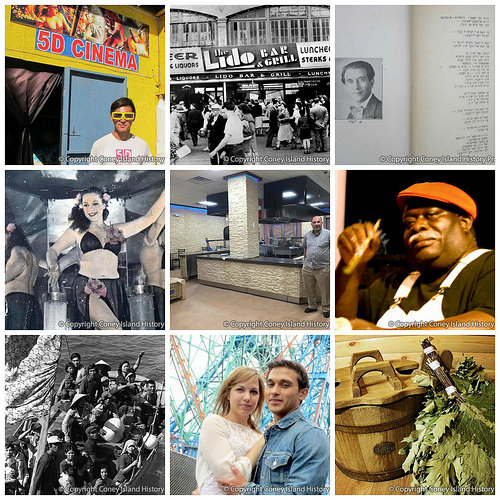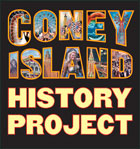
Visit the Coney Island History Project's redesigned Oral History Archive to listen online to audio interviews with Coney island residents, business owners, and visitors - both past and present - as well as our new Immigrant Narratives of Southern Brooklyn series. Among the recent additions to our online archive are the following interviews. Please listen, share, and if you or someone you know would like to record a story, message us via this page to schedule an interview.
Eldorado ticket taker Mary Hood came to Coney Island as a child and worked on the Bowery well into her 90s. During the 1930s to 1950s, she worked all the sideshows in Coney Island and would also substitute for Madam Tirza at the Wine Baths when Tirza was missing in action. Charles Denson recorded several interviews a few years before she died in 2013. She was one of a kind.
Steve Arniotes and his family operated the Lido Restaurant and Bar on the Coney Island Boardwalk from 1927 until 1960. Steve and his brother were lawyers and both became judges. Arniotes describes his family roots and what it was like to operate a popular attraction at the "World's Playground."
Hector George Wallace tells the story of his immigration from Jamaica to England to Coney Island, where he has been an itinerant sign painter for the past four decades. Wallace's painting style is ubiquitous, and can be seen on the facades of Ruby's, Paul's Daughter, and Pete's Clam Bar. Although Wallace has formal art training, his signs are Coney Island primitive and have become collectibles. His style of art work is rapidly disappearing and being replaced by plastic corporate signage.
For the Coney Island History Project's first-ever "on-ride" oral history, interviewer Samira Tazari mixed recordings of her ride on the Bowery's popular 5D Cinema and an interview with the indie attraction's owner Terry Zheng. Known as "Tommy" to his fellow Coney Island business owners, he was born Cai Feng Zheng in China, and started his business in Coney Island while still in his 20s.
A native of Kiev, Mermaid Spa founder Boris Kotlyar talks about bringing the Russian banya tradition to Coney Island. In the mid-1990s, together with Ukrainian-American friends who felt the lack of an authentic Russian bathhouse in Southern Brooklyn, he set about researching how to build a banya as close as possible to that which they remembered. The interview was recorded in Russian, and includes Russian and English transcripts.
Eva Zucker recounts memories of growing up in a Yiddish literary household in 1940s and 1950s Coney Island and Sea Gate. Her father was the Yiddish poet A. Lutzky, who made a living writing Saturday poems for the newspaper Der Tog and organizing concerts by cantors and poets. He loved to write on trolley cars and buses going from Sea Gate to Manhattan, accompanied at times by his daughter. A. Lutzky was the pseudonym of Aaron Zucker (1894-1957).
Among the more than 800,000 refugees who fled Vietnam in the years after the fall of Hanoi and safely arrived in another country are the Luong family, who were resettled in New York City and have been homeowners in Coney Island for more than 25 years. Now in his 70s and retired, Mr. Luong looks back on the hazardous journey, his first years as an immigrant, and the "sheer good luck" that brought him his first job. The interview was recorded in Cantonese, and includes Chinese and English transcripts.
One Saturday in May when we arrived to open up the Coney Island History Project exhibit center, a group of people holding signs that spelled out WILL YOU MARRY ME??????? caught our eye. A couple was getting engaged on the Wonder Wheel! After Max from Brooklyn proposed to Stef from Montreal and she said yes, they shared their story with Charles Denson in our recording studio beneath the Wonder Wheel.
Levent Demirgil is the owner of Coney Island Gourmet in Stillwell Terminal which was shuttered for nearly three years since being devastated by Hurricane Sandy. The interview was recorded when renovations were underway and the store recently reopened as a restaurant called Magic Gyro. He talks about the history of Coney Island, and, because "it became lively once more," his hopefulness for its future. The interview was recorded in Turkish, and includes Turkish and English transcripts.

Add new comment